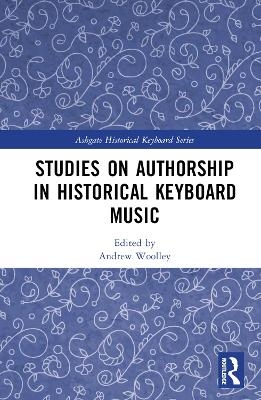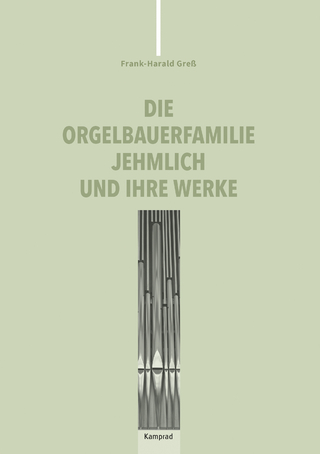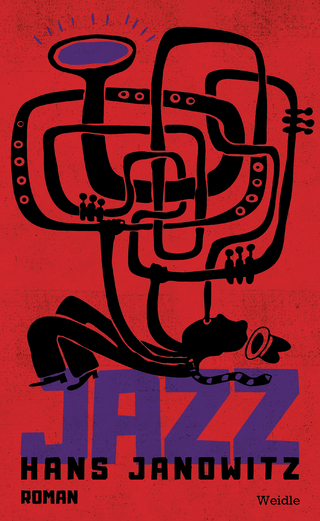
Studies on Authorship in Historical Keyboard Music
Routledge (Verlag)
978-1-032-16811-1 (ISBN)
Authorship is a pertinent issue for historical musicology and musicians more widely, and some controversies concerned with major figures have even reached wider consciousness. Scholars have clarified some of the issues at stake in recent decades, such as the places of borrowing and arranging in the creative process and the wider cultural significance of these practices. The discovery of new sources and methodologies has also opened up opportunities for reassessing specific authorship problems. Drawing upon this wider musicological literature as well as insights from other disciplines, such as intellectual history and book history, this book aims to build on what has already been achieved by focussing on keyboard music. The nine chapters cover case studies of authorship problems, the socioeconomic conditions of music publishing, the contributions of composers, arrangers, copyists and music publishers in creating notated keyboard compositions, the functions of attribution and ascription, and how the contexts in which notated pieces were used affected concepts of authorship at different times and places.
Andrew Woolley is a musicologist and Invited Researcher at CESEM, the Centre for the Study of the Sociology and Aesthetics of Music at the Universidade Nova de Lisboa. He is currently co-investigator for the Portuguese-government, FCT-financed project, ‘Music paper and handwriting studies in Portugal (18th and 19th centuries): the case study of the collection of the Count of Redondo’.
List of figures
List of tables
List of music examples
List of contributors
List of abbreviations
Manuscript (RISM) Sigla
Introduction
ANDREW WOOLLEY
1 Conrad Paumann’s fundamentum? New light on authorship in fifteenth- and sixteenth-century instrumental music
AUGUST VALENTIN RABE
2 Authorship in sixteenth-century Italian printed keyboard music
CRISTINA CASSIA
3 Authorship and identity in early English keyboard music
DAVID J. SMITH
4 Authorship and improvisation in sixteenth- and seventeenth-century keyboard music
ANDREW WOOLLEY
5 Chronology, style and attribution in the early keyboard suites of J. S. Bach
FRANCIS KNIGHTS, PABLO PADILLA AND MATEO RODRIGUEZ
6 The authorship of BWV 565: Disputing former methodologies and assessing the evidence of five new manuscript sources
JOHN SCOTT WHITELEY
7 ‘Es fällt kein Meister vom Himmel’: W. F. Bach’s juvenilia and the methods of creative imitation
MATTHEW J. HALL
8 Many hands make light work: ‘Nel cor piu non mi sento’ and multiple layers of authorship at the keyboard
PENELOPE CAVE AND KATRINA FAULDS
9 Authorship and authenticity in John and William Crotch’s Original Airs (1803)
ALICE LITTLE
Index
List of Figures
Fig. 1.1. Conrad Paumann (Franz Trautmann, 1849)
Fig. 1.2. Franz Liszt (Josef Danhauser, 1840)
Fig. 5.1. First and second Principal Components of the melodic lines from the allemandes BWV 809, 816-817, 821, 829 and 832-833.
Fig. 5.2. First and second Principal Components of the bass lines from the allemandes BWV 809, 816-817, 821, 829 and 832-833.
Fig. 6.1. Kilian’s 1979 stemmata [A = ‘Autograph’].
Fig. 6.2. The only known instances of fermatas in the final bar of BWV 565/1. Upper left: Ritz (Mendelssohn) (reproduced by kind permission of The Bodleian Libraries, University of Oxford, c.103, r1); lower left: Ringk (from Staatsbibliothek zu Berlin: Digitised Collections, ); right: Rara II.134 (reproduced by kind permission of the Bach-Archiv, Leipzig).
Fig. 6.3. Rara II.134: BWV 565 showing Layers 1 and 2 (darker ink). Reproduced by kind permission of the Bach-Archiv, Leipzig.
Fig. 6.4. Voß titles. Upper: front cover incipit; lower: main page title. Reproduced by kind permission of the Staatsbibliothek zu Berlin - Preußischer Kulturbesitz, Musikabteilung mit Mendelssohn-Archiv.
Fig. 6.5. Revised stemmata for BWV 565.
Fig. 7.1. An opening in W. F. Bach’s Liber Exercitiorum, showing entries from February 1727 (D-EIb Mu. Nr. 6.1.3.1, pp. 82–3). Image: Bachhause und Museum, Eisenach, used by permission.
Fig. 7.2. Clavierbüchlein, fol. 7v; ‘Allemande.’, first system’s clefs, time signature, and pickup notes in the hand of J. S. Bach; otherwise in the hand of W. F. Bach. Image: Bach digital, licensed under a Creative Commons Attribute-NonCommercial 4.0 International License.
Fig. 7.3. Hypothesis for how W. F. Bach held the Clavierbüchlein open during model composition of BWV 924a. Photo illustration: the author; incorporated image: Bach digital, licensed under a Creative Commons Attribute-NonCommercial 4.0 International License.
Fig. 8.1. Stationers’ Hall register for July 1796, showing the registration of the Three Original Sonatas under both Dussek’s and Pleyel’s names by Corri, Dussek & Co., Stationers’ Company Archive, TSC/1/E/06/13, image reproduced with permission of the Stationers’ Company.
Fig. 8.2. Title page of Pleyel’s Three Original Sonatas, The Bodleian Libraries, University of Oxford, Mus. Instr. I, 194 (7), Creative Commons licence CC-BY-NC 4.0.
Fig. 8.3. Title page of Dussek’s Three Original Sonatas, © The British Library Board, Music Collections g.150.(7.).
Fig. 9.1. John and William Crotch’s Original Airs, p. 14 (exemplar: GB-NWr 11245).
Fig. 9.2. J. B. Crotch’s tunebook, GB-Lbl Add. MS 30272, p. 26 (fol. 17v), © The British Library Board, used with permission.
List of Tables
Table 1.1. The structures of Loc1 and Erl
Table 1.2. Synopsis of the structures of Bux6–8
Table 3.1. Genres of English secular keyboard music of the Byrd School
Table 3.2. Intabulation of English dances in manuscripts associated with Sweelinck and his students
Table 3.3. Ascriptions involving composers of original material and of keyboard settings in the Fitzwilliam Virginal Book
Table 4.1. Summary of the sources for two voluntaries by Christopher Gibbons
Table 5.1. Bach’s major keyboard suite collections
Table 5.2. Miscellaneous early suites attributed to Bach.
Table 6.1. The manuscripts of BWV 565 known in 1979.
Table 6.2. The manuscripts of BWV 565 discovered since 1979.
Table 6.3. BWV 565: main differences in the readings of Ritz (Mendelssohn) and Ringk.
Table 6.4. BWV 565: different readings in Dröbs and Rara II.134 Layer 1.
Table 6.5. Different readings in BWV 565: Ringk and Rara II.134 Layer 1.
Table 6.6. Hallmark readings in [P] that are not found in [T]
Table 7.1. Wilhelm Friedemann Bach’s commonplace books, 1723–1727
Table 7.2. Chronological sequence of W. F. Bach’s entries in the Clavierbüchlein
List of Music Examples
Ex. 1.1. Comparison of a discant clause according to Wolff, p. 209.
Ex. 1.2. The clause from Example 1.1 (Loc1, p. 50, line 3–4) without error correction.
Ex. 3.1 Transcription of two settings of a symphony by William Lawes for The Triumph of Peace (1634) from a) Anne Cromwell’s Virginal Book, and b) Elizabeth Rogers hir Virginal Book.
Ex. 3.2 Opening of an anonymous arrangement of ‘My heart will go on’, the love theme from Titanic.
Ex. 3.3. Sellingers Rownde.
Ex. 3.4. ‘fife and drum’. Extract from ‘The battle by mr: bird’ in Priscilla Bunbury’s Virginal Book, fol. 22v.
Ex. 4.1. Johann Jakob Froberger, Fantasia FbWV 204, bb. 1–8, 53–6 and 73–8: as published in Diverse curiose e rarissime partite (Mainz: Ludwig Bourgeat, 1685) (a); as modified by John Blow (b).
Ex. 4.2. Jacques Champion de Chambonnières: ‘Allemande La Dunquerque’ (GusC 7) (a); ‘Allemande du même auteur’ (GusC 72) (b).
Ex. 4.3. Matthew Locke: Almain (Melothesia, p. 4), first half (a); Almain (Melothesia, p. 14), first half (b).
Ex. 4.4. Jacques Champion de Chambonnières, Sarabande (GusC 34) (a) and Jean Henry D’Anglebert, Galliarde (b), bb. 1–16, melodies.
Ex. 4.5. Johann Jakob Froberger, Ricercare (FbWV 407/407a): as copied into A-Wn Mus. Hs. 18707 (a); as published in François Roberday, Fugues et Caprices a Quatre Parties (Paris: Jean Hanocq, & Jacques Laisné, 1660) (b).
Ex. 6.1. BWV 565, bb. 57–9 (a); Pachelbel, Fantasia in D minor, bb. 32–3 (Newman 1995) (b); Buxtehude, Praeludium BuxWV 140, b. 4 (Williams 1980) (c).
Ex. 6.2. J.S. Bach, Cembalo Concerto, BWV 1053/3, bb. 138–40, transposed to D minor (a); C.P.E. Bach, Fugue in D minor, Wq. 119, no. 2, bb. 47–9 (b).
Ex. 6.3. BWV 565, bb. 60–1 (a); J. P. Kellner, Certamen musicum: Suite in D (N01: 02), Allemande, bb. 5–6 (transposed up a minor sixth) (b).
Ex. 6.4. C.P.E. Bach, Rondo in A, Wq. 58/1, bb. 79–83 (transposed a major sixth lower) (a); BWV 565, bb. 79–82 (b).
Ex. 6.5. BWV 565, bb. 116–18 (a); C.P.E. Bach, Solfeggietto in C minor, Wq. 117/1, bb. 1–3 (transposed a tone higher) (b).
Ex. 6.6. BWV 565, b. 72.
Ex. 6.7. BWV 565/1, the only instances of slurs in bb. 18–19.
Ex. 7.1. W. F. Bach, Allemande BWV 836, first strain melody.
Ex. 7.2. BWV 836, parallel structure of bb. 2–5 and bb. 8–12.
Ex. 7.3: Johann Richter, Allemande in C (fol. 27v), bb. 2d–5b.
Ex. 7.4. Triple counterpoint in BWV 927a, mm. 1–4.
Ex. 7.5. Composition by means of elaborated copying: J. S. Bach, BWV 924, bb. 1–7 (a);
W. F. Bach, BWV 924a, bb. 1–8 (b).
Ex. 7.6. J. S. Bach, BWV 924 mm. 1–7 (a); W. F. Bach, BWV 924a mm. 1–8 (b).
List of Contributors
Cristina Cassia holds a PhD in Musicology co-sponsored by the CESR of Tours and the Université Libre de Bruxelles (ULB - FNRS). From 2018 to 2020 she was researcher at the Schola Cantorum Basiliensis in Basel and then Marie Skłodowska-Curie Fellow at the University of Padua.
Penelope Cave is an international prize-winning harpsichordist and specialist in early keyboards, and has taught, performed and broadcast throughout Europe. She was awarded a doctorate at the University of Southampton in 2014, funded by the AHRC and the National Trust, on music in the English country house.
Katrina Faulds is a musicologist with research interests in domestic music collections and social dance music of the eighteenth and nineteenth centuries. She was a postdoctoral research fellow on the AHRC-funded ‘Music, Home and Heritage’ project and a historical consultant on the HEIF-funded ‘Re-sounding the Past: Decolonising Sonic Heritage Spaces’ project.
Matthew Hall Matthew J. Hall is a lecturer in music at Ithaca College, where he teaches music history, theory, and organ and harpsichord performance, and managing editor of the Journal of Musicology. His research focuses on J. S. Bach and extends to compositional process, apprenticeship, and issues of borrowing and authorship in the early modern period (1400–1800).
Francis Knights is a Fellow & Tutor at Fitzwilliam College, University of Cambridge, Editor of Harpsichord & Fortepiano and Chairman of the National Early Music Association, UK. He has research interests in organology, pedagogy, performance practice and manuscript sources. He is a busy recitalist, and has recently completed major cycles of all Bach’s keyboard music and the Tudor virginalist repertoire.
Alice Little is a Research Fellow in the Music Faculty at Oxford University, based in the Bate Collection of Musical Instruments. From 2018–22 Alice was a Junior Research Fellow at Corpus Christi College, Oxford, and from 2019–21 held a TORCH Knowledge Exchange Fellowship.
Pablo Padilla is professor of mathematics at the Institute for Applied Mathematics (IIMAS) of the National Autonomous University of Mexico (UNAM), and teaches in both the science and music faculties.
August Rabe is a postdoctoral researcher at the University of music and performing arts Vienna. He studied musicology, harpsichord/historical keyboard instruments and art history at the Hochschule für Musik Franz Liszt Weimar and the Friedrich Schiller University Jena. His interests include music for keyboard instruments from the fifteenth to the seventeenth centuries as well as singing and improvisation techniques of the early modern period.
Mateo Rodriguez Mateo Rodríguez obtained a BSc in Physics at the National Autonomous University of Mexico. He is currently studying for a Masters in Mathematics, and is finishing a BA in Composition at the National Institute of Fine Arts.
David J. Smith moved to Northumbria University as Founding Head of Music in 2018. His research revolves around early modern instrumental music in England and the Low Countries, especially for keyboard. He has published editions of instrumental music by Peter Philips and Richard Dering in the scholarly series, Musica Britannica, and is currently leading an AHRC-funded project on digital directions of collected editions.
John Scott Whiteley Organist Emeritus, York Minster, became known for BBC television’s series, 21st-Century Bach. He is a Visiting Research Fellow at The University of Huddersfield and Academic Adviser to the Orgelbüchlein project. His work has been published in the Bach-Jahrbuch and The New Grove.
Andrew Woolley is a musicologist and Invited Researcher at CESEM, the Centre for the Study of the Sociology and Aesthetics of Music at the Universidade Nova de Lisboa. He is currently co-investigator for the Portuguese-government, FCT-financed project, ‘Music paper and handwriting studies in Portugal (18th and 19th centuries): the case study of the collection of the Count of Redondo’.
Abbreviations
A
Alto
AM
Acta Musicologica
b., bb.
bar, bars
B
Bass
BACH
BACH: Journal of the Riemenschneider Institute
BJB
Bach-Jahrbuch
c.
circa
Ch.
Chapter
CM
Current Musicology
CUP
Cambridge University Press
diss.
dissertation
ECM
Eighteenth-Century Music
ed(s)., edn.
edited by, edition
EM
Early Music
fl.
floruit (flourished)
fol., fols.
folio, folios
Fontes
Fontes Artis Musicae
GMO
Oxford Music Online. Grove Music Online, ed. Deane L. Root (Oxford University Press) [www.oxfordmusiconline.com]
HUP
Harvard University Press
JAMS
Journal of the American Musicological Society
JM
The Journal of Musicology
JSCM
Journal of Seventeenth-Century Music
LUP
Leuven University Press
LH
left-hand
man.
manual
MD
Musica Disciplina
MGG
MGG Online, ed. Laurenz Lütteken (Bärenreiter) [https://www.mgg-online.com]
MQ
The Musical Quarterly
MT
The Musical Times
M&L
Music & Letters
NBA
Bach-Archiv Leipzig & Johann-Sebastian-Bach-Institut Göttingen, Johann Sebastian Bach. Neue Ausgabe sämtlicher Werke (Bärenreiter: Kassel 1954–2007).
NEMAN
National Early Music Association Newsletter
Notes
Notes: the Quarterly Journal of the Music Library Association
n.d.
no date
n.p.
no publisher
OUP
Oxford University Press
OY
The Organ Yearbook
p., pp.
page, pages
RBM
Revue belge de Musicologie / Belgisch Tijdschrift voor Muziekwetenschap
rev.
revised by
RH
right-hand
rpt.
reprint
S
Soprano
SB
Sounding Board
T
Tenor
trans.
translated by
TVNM
Tijdschrift van de Vereniging voor Nederlandse Muziekgeschiedenis
vdm
Verzeichnis deutscher Musikfrühdrucke
vol(s).
volume(s)
Manuscript (RISM) Sigla
A-Wn
Österreichische Nationalbibliothek, Vienna
B-Br
Bibliothèque royale de Belgique (KBR), Brussels
Ch-Zz
Zentralbibliothek, Zürich
Ch-Bu
Universitätsbibliothek, Basel
D-ERu
Universitätsbibliothek Erlangen-Nürnberg, Hauptbibliothek, Erlangen
D-B
Staatsbibliothek zu Berlin - Preußischer Kulturbesitz, Musikabteilung, Berlin
D-Bs
Stadtbibliothek, Musikbibliothek, Berlin
D-EIb
Bachhaus und Bachmuseum, Eisenach
D-Hs
Staats- und Universitätsbibliothek Carl von Ossietzky, Hamburg
D-LEb
Bach-Archiv, Leipzig
D-LEm
Leipziger Stadtbibliothek, Leipzig
D-LEsa
Stadtarchiv, Leipzig
D-Lr
Ratsbücherei, Lüneburg
D-Mbs
Bayerische Staatsbibliothek, München
D-Wa
Niedersächsisches Landesarchiv - Standort Wolfenbüttel, Wolfenbüttel
F-Pn
Bibliothèque nationale de France, Paris
GB-Cfm
Fitzwilliam Museum, Cambridge
GB-Lbl
British Library, London
GB-Lcm
Royal College of Music, London
GB-NWr
Record Office, Norwich
GB-Ob
Bodleian Library, Oxford
GB-Och
Christ Church, Oxford
H-Bn
Országos Széchényi Könyvtár, Budapest
I-Fn
Biblioteca nazionale centrale, Florence
PL-Kj
Biblioteka Jagiellońska, Kraków
S-Uu
Universitetsbibliotek, Carolina Rediviva, Uppsala
US-NH
Yale University, Music Library, New Haven, CT
US-NYp
New York Public Library
| Erscheinungsdatum | 02.11.2023 |
|---|---|
| Reihe/Serie | Ashgate Historical Keyboard Series |
| Zusatzinfo | 16 Tables, black and white; 4 Line drawings, black and white; 37 Halftones, black and white; 41 Illustrations, black and white |
| Verlagsort | London |
| Sprache | englisch |
| Maße | 156 x 234 mm |
| Gewicht | 600 g |
| Themenwelt | Kunst / Musik / Theater ► Musik ► Instrumentenkunde |
| Kunst / Musik / Theater ► Musik ► Klassik / Oper / Musical | |
| ISBN-10 | 1-032-16811-0 / 1032168110 |
| ISBN-13 | 978-1-032-16811-1 / 9781032168111 |
| Zustand | Neuware |
| Informationen gemäß Produktsicherheitsverordnung (GPSR) | |
| Haben Sie eine Frage zum Produkt? |
aus dem Bereich


